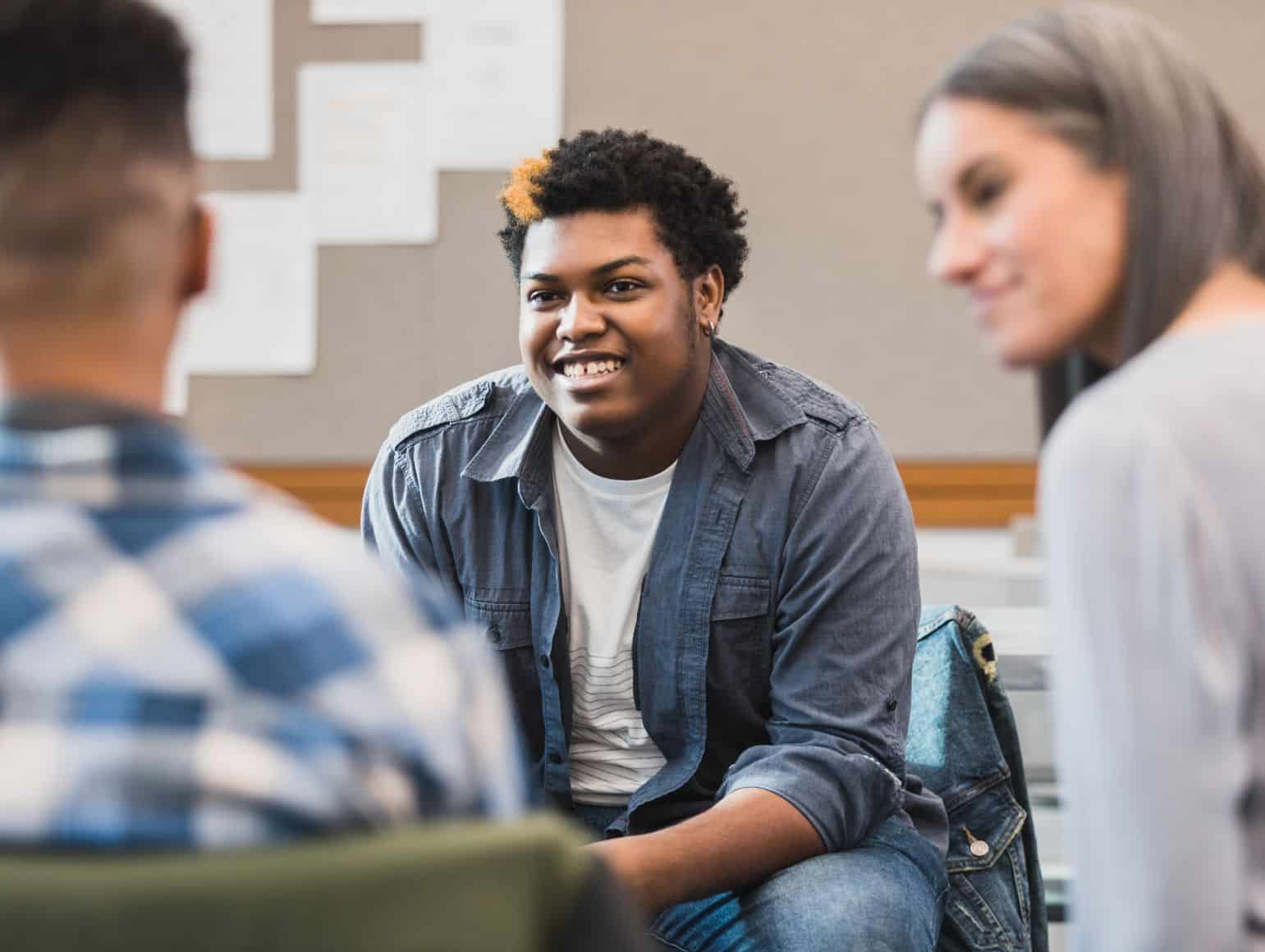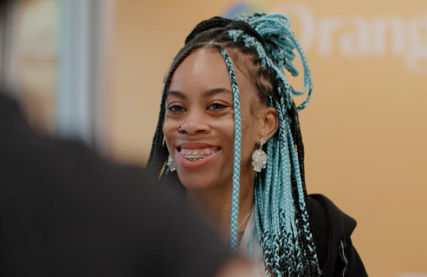Share
A Second Chance Through Restorative Justice in Orange County
When eight young men walked across a courtroom floor, it wasn’t to face charges — it was to celebrate a hard-earned fresh start. A recent Young Adult Court graduation in Santa Ana marked a powerful milestone not just for the men who completed the program, but for the families, court officials, and community partners who continue to believe in second chances.
Among the graduates was Sam Solorio, a young man from Santa Ana whose story was recently featured in the Orange County Register. Just a few years ago, Sam found himself facing felony charges. Today, he holds a commercial truck driver’s license and a full-time job delivering mail with the United States Postal Service throughout the lower 48 states.
“Beyond career success, Young Adult Court provided me with something just as important — a healthier mindset,” Sam shared. “With therapy, mentorships and the many activities they offered, I learned how to process my emotions, handle challenges and stay focused on my goals.”
“With therapy, mentorships and the many activities they offered, I learned how to process my emotions, handle challenges and stay focused on my goals.”
Sam Solorio, Young Adult Court Graduate
Sam is one of dozens of young men who have graduated from Young Adult Court — a restorative justice program offering young adults the opportunity to break the cycle of incarceration and step into long-term stability.
Why Young Men? The Science Behind the Program
The foundation of Young Adult Court is rooted in neuroscience and developmental psychology. Dr. Elizabeth Cauffman, a UC Irvine psychologist and one of the program’s co-founders, has spent decades studying the intersection of brain development and the law. Her research helped shape the program’s focus on young men between the ages of 18 and 25 — a stage of life where risk-taking behavior often peaks before leveling off as the brain matures.
“Crime peaks during that time, from ages 18 to 25, and then it declines, coinciding amazingly well with brain development,” Cauffman explains. “It’s usually the age when we all do our most stupid stuff.”
The design of Young Adult Court reflects this understanding: that intervention at the right time, with the right tools, can change the trajectory of a young person’s life.
A Judge’s Vision for Change
Young Adult Court was co-designed by Dr. Cauffman and Orange County Superior Court Judge Maria D. Hernandez, who recognized that traditional approaches to justice weren’t meeting the needs of emerging adults. Judge Hernandez brings decades of courtroom experience and a deep commitment to using research-backed interventions to better serve youth.
“When young people in this age category get involved in the criminal justice system, we need to do a better job at how we address their needs, their outcomes, and how to support them,” she shared. “You don’t treat the 20-year-old the same way you’re going to treat a 35-year-old man who comes before the court system.”
Her leadership has been instrumental in shaping Young Adult Court into what it is today: a nationally recognized model for developmentally appropriate, rehabilitative justice.
Orangewood’s Role: Empowerment Through Support
Orangewood Foundation became the case management support partner for Young Adult Court at its inception, standing shoulder to shoulder with the Orange County Superior Court and UCI to offer young men something the traditional system too often lacks: a real path forward.
Once a young man is accepted into the program, Orangewood becomes his anchor. Each participant is matched with a dedicated care coordinator who provides consistent, trauma-informed guidance over the 18- to 24-month journey. From housing referrals and financial support to therapy access, job readiness, and life skills coaching, Orangewood staff walk alongside participants every step of the way.
We also support peer mentorship opportunities — bringing in program graduates to inspire and encourage current participants — and offer group activities that help rebuild connection to family and community.
“We focus on empowering young men and offering them a second chance to reclaim opportunities for the future they want — through independence and accountability,” says our Young Adult Court team.
This isn’t a light-touch program. It’s rigorous and life-changing, and it works. Graduates are significantly less likely to be rearrested, more likely to be employed, and better equipped to maintain housing and personal stability. Our approach is holistic, individualized, and rooted in the belief that every young person deserves to be seen as more than their worst mistake.
Graduation Day: More Than a Ceremony
The graduation ceremony is deeply emotional. It’s a moment of reflection — for the young men who’ve put in the work and for the community that stood beside them. It’s also a bold reminder that a collaborative approach to justice isn’t just possible — it’s transformational.
“This is not just a courtroom,” said Judge Hernandez. “This is a collaborative, multidisciplinary approach to doing the justice system in a different way — and, quite frankly, in a better way.”
Supporters from every corner of the justice system show up: public defenders, probation officers, district attorneys, law enforcement, and nonprofit leaders — all united around the belief that change is possible when the right supports are in place.
As Sheriff Don Barnes told the graduates: “You get a fresh start.”
“You get a fresh start.”
Sheriff Don Barnes
It Takes a Village
Behind every Young Adult Court graduation is a vast network of collaboration. From university researchers to probation officers, judges to mentors, everyone plays a role. Orangewood’s team is proud to be on the front lines — not only helping young men navigate complex systems, but standing with them through setbacks, breakthroughs, and everything in between.
Even with the program’s success, there are skeptics. “The biggest criticism I get is that I’m okay with criminals being out in the community,” said Frankie Martinez, Manager of Support Services at Orangewood Foundation. “But critics don’t always see the other side — where we support these young men to improve their well-being, to integrate within society, to contribute to the community by becoming self-sufficient young men who pay taxes and hold jobs.”
It’s not about giving anyone a free pass — it’s about giving them a real shot.
Why Restorative Justice Matters
Young Adult Court is redefining what justice can look like. By addressing the root causes of criminal behavior — like trauma, unstable housing, and lack of opportunity — and offering comprehensive support instead of punishment, the program is changing lives and restoring hope.
“Your growth is not about perfection,” said Kristal Bastedo, Lead Care Coordinator for Young Adult Court. “It’s about progress.”
Sam Solorio agrees. “Young Adult Court helped me break through the mental barriers that once held me back,” he said. “It replaced them with confidence, self-worth, and the drive to keep pushing forward.”
At Orangewood, we’re proud to be part of this life-changing work — and honored to continue walking alongside the young men who choose to take this step forward.
Learn more about Orangewood’s role in Young Adult Court and how you can support second chances for justice-involved youth.
Read the original article by the Orange County Register’s Jonathan Horwitz here (may require subscription).





